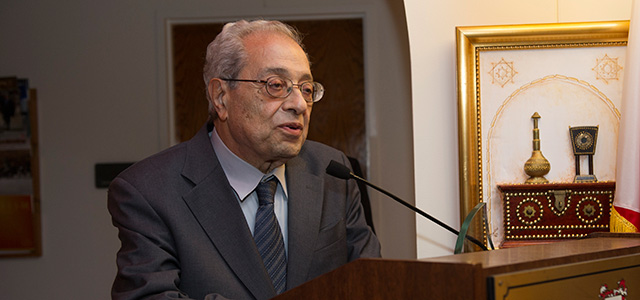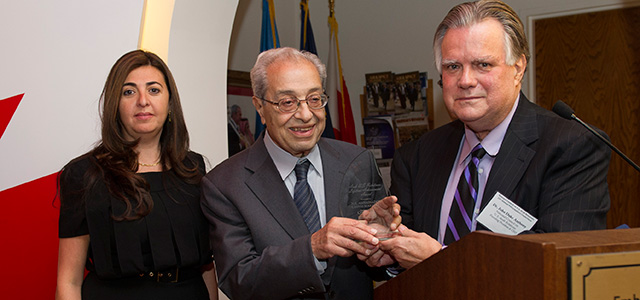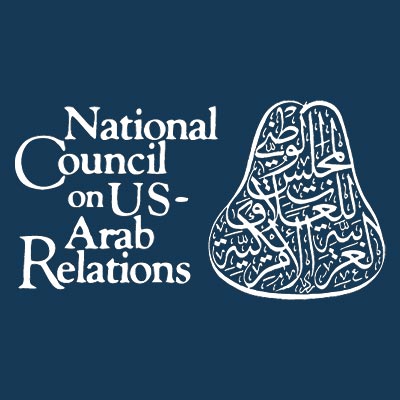This past week, a larger than life figure among us fell physically. Although in our presence his body is no more, as example, as role model, and as inspiration, he is still in front of, beside, and behind us – and will remain so for a very long time to come.
Ambassador Clovis Maksoud’s reputation was legendary as far back as during my studies at the School of Advanced International Studies (SAIS) at Johns Hopkins University in the 1960s.
Whenever one had the privilege and pleasure to meet and be with as well as briefed by Clovis, regardless of the subject, one could not but revel in his perennially upbeat personality and marvel at the many unrivaled aspects of his professionalism. Among humanity’s orally gifted and silver-tongued orators, Clovis could be, and in numerous instances was, nothing short of spellbinding. Certainly, he earned my awe early on. Never once in my presence did he use notes or even have, for easy recall, a slip of paper tucked away on which he had written something.
Whatever the subject he happened to be addressing, Clovis was invariably not only articulate; he was also frequently eloquent. His delivery and diction were flawless. Indeed, one at times had reason to wonder whether he had switched languages, for his use of English could be inventive – more than a few will acknowledge that, sometimes, it took a bit of getting used to the kinds of words and phrases he used with unsurpassed exactitude to hammer home his points. Even now one can hear him thundering about the cause that remained to the end dearer to him than any other, that of the Palestinians.
Who can forget Clovis’ forever repeating that, among the biggest obstacles to strengthening and expanding the Arab-U.S. relationship were the United States’ history and policies with respect to Palestine? These, he never tired of emphasizing, lay at the heart of what he aptly termed America’s “crisis of conscience.”

What Clovis was and stood for to the last – in the way of unbridled conviction, steadfast commitment, and unflinching moral courage – are bedrock guidelines by which one can live a purposeful, meaningful, and contributive life. What he epitomized – in his manners and elemental decency, in his unfailing kindness, and in his manifesting the gamut of Arab, Islamic, Middle Eastern Christian, Druze, and other humanistic values, ideals, and principles to which so many aspire – has left an indelible impression not just upon me but many.
Despite being in Clovis’ presence on countless occasions for nearly half a century, it was only in the past decade and a half that we stopped being acquaintances and instead became friends. With each passing year, we became ever closer in this regard. Our friendship became stronger with my visiting with him when his wife Hala was deathly ill. It was beginning to be strong with her, too, but as she and I knew, and he knew, too, this came later than the three of us had wished.
On one occasion Hala and I were in a crowd to which, other than myself, she, who was quintessentially Arab, and three dozen or so other Arabs and Arab-Americans had been invited. Despite my being out of place, or perhaps because of it, for that would have been Hala’s way as well as Clovis’, Hala took me aside. She shared with me quietly what it was like to so frequently undergo cancer treatment while the disease was spreading rapidly through her body. Despite being at times in unbearable pain, fully aware that her time remaining was short, with tears in her eyes she wanted me to know that she was still desperate to live so as to continue to do what she could for the betterment not of herself but others.
Clovis, too, was like that and, like Hala, would remain so until the end.
What always struck me as remarkable was that Clovis was nearly blind. Yet he never once complained about his situation in this regard within my earshot. He refused to let his handicap prevent him from doing, being, and contributing to humanity the best of everything he had to give. Would that everyone were the same.
Two occasions with Clovis will always be unforgettable. One was in Morocco. We were there for one of then-Moroccan Foreign Minister Mohammad Benaissa’s annual conferences in the hometown of Benaissa’s modest boyhood, Asilah. On Clovis’ and my way back to Washington, the route unexpectedly proved different than what our air tickets had indicated. The situation was disruptive of everyone’s plans – a third person, George Salem, was with us. The arrangements resulted in one delay after the other. We remained stuck in foreign airports for hours.
The lengthy delays were uncomfortable for Clovis in particular, mainly on account of his failing eyesight. However, not once did he complain. But for George and me, he would have been by himself, unable to see well, liable to fall, or become disoriented and lost. George and I were determined that not for one moment would we leave Clovis alone. In the circumstances, the three of us became closer than before. Thereafter, whenever Clovis and I were together, our relationship never reverted to what it once had been.

The other occasion was an evening event two or three years ago produced mainly for the Arab diplomatic corps and the community of Arab-Americans that live and work in the nation’s capital. Among the invited guests, yours truly seemed to be one of the exceptional few in neither category.
The event took place in the main hall of the Ronald Reagan Building and International Trade Center. For me at least, my arrival was a bit embarrassing, for the festivities had been underway for at least half an hour. Late as it was, and despite my effort to sneak in unnoticed, a “minder” of sorts, who had been posted by Clovis and asked to be on the lookout, sprang from out of nowhere and ran to greet me at a side door through which it had been my hope to enter unobtrusively.
The minder promptly said, “Ambassador Maksoud has been asking about you. He wanted to know when and if you would be coming, as someone told him that you were invited. He will be happy to know that you’ve arrived.”
Astonished and pleased to hear words of such unabashed endearment as these – from someone who had long been the League of Arab States Ambassador to India, to the United Nations, and to the United States, and with whom my good fortune had been to become his friend and he mine – my first thought was to quickly say hello to him wherever he was, not interrupt the proceedings, and try to blend in with the crowd.
“No,” the minder said. “He’s asked us [the ‘us’ turned out to mean that more than one minder had been appointed, just in case] to bring you to him. He’s asked several times, ‘Where’s John Duke? Is he coming? I want him to be with me.'”
From afar, one could see Clovis fairly clearly. He was standing at some distance in the middle of the room near the front of the crowd. In the circumstances, it seemed to me that my going to where he was would be presumptuous and intrusive. But my minder urged, “Come on, he’s waiting for you. I’ll take you to him. He’ll be really pleased.”
Disbelief on my side notwithstanding, what the minder said proved to be true. When it was possible, with the help of the minder, for me to make it to Clovis’ side, after an effusive greeting and embrace, his first words to me were, “Where have you been? When I asked, someone told me you would be coming. I have been waiting for you. Here, let me get you a chair.” – this from someone who was my elder by at least a decade and a half. My reply was to thank him while indicating that standing beside him would be my honest preference.
For most of the event, in between applauding this and that performance, the two of us stood arm in arm. In the parameters of Arab culture having to do with the relationship between two men who have long known each other and are fond of one another, loosely locking our arms in front of everyone was not unusual. It was an appropriate and normally affectionate way of two friends expressing their mutually warm and genuine relationship of comfort and respect. In those special moments, the two of us would have had it no other way.
There for all to see was Ambassador Clovis Maksoud, born in America, raised from infancy in Lebanon, the consummate diplomat imbued with the ideals of the Non-Aligned Movement, an unapologetic and patriotic Arab nationalist dating from the era of Egypt’s Gamal Abdel Nasser, and an intellectual and scholar of the first order, who to the marrow of his bones was as Arab as they come. The other, born and raised in the United States, had no reason to be anything other than the American that he was – who had met, knew, and become the good friend of Clovis Maksoud.
If the two together arm-in-arm did not personify then and thereafter whenever they were together the essence of the Arab-U.S. relationship at its most hopeful and mutually trustful level – or at least the gist of it and what it was then, had once upon a time been, and could once again become – then it would be difficult to imagine what would.
Allah yirhamu, my friend.

